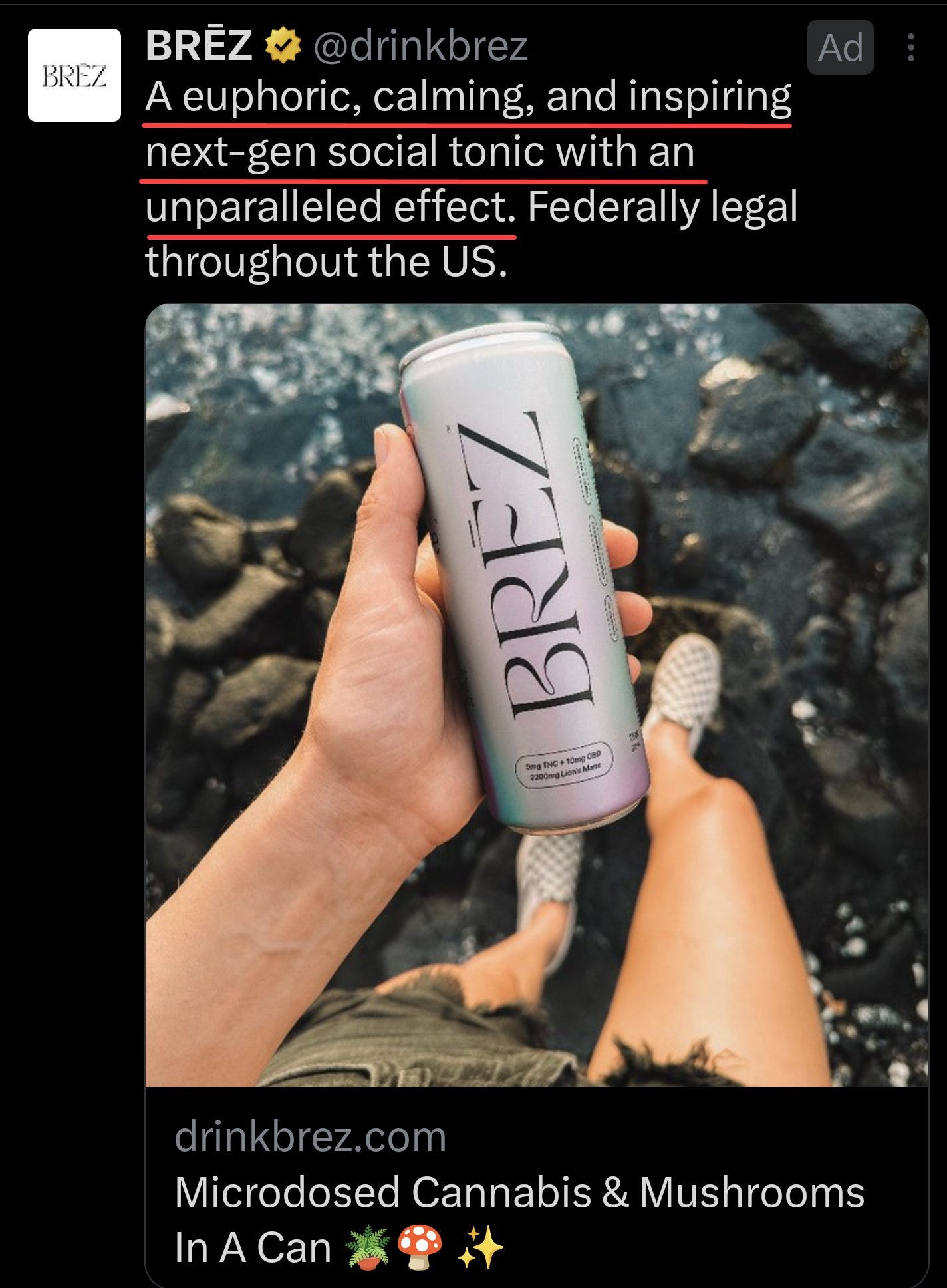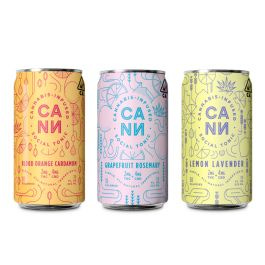Maybe you’ve decided to try a “Dry July.” Maybe you’re just — to use the term that’s been bouncing around for the last five years or so — “sober curious.” Either way, you don’t want to look like a Puritan in front of your imbibing pals, and you worry that even a vice-ified can of water won’t help you keep up appearances.
You, my friend, are the target audience for a social tonic.
Something euphoric, calming, and inspiring. Oh, and next-gen, bien sûr.

Mike Pope passed this ad along to me after posting it on X/Twitter last month with the comment “Words, what do they even mean?”
Let’s find out.
“Social tonic” may have been new to Mike (and to me), but we’re probably just late to the sober-curious party. BRĒZ, which is based in West Palm Beach, Florida, and which launched in April 2023, is just one of several brands using “social tonic” as a descriptor for their liquid refreshment. Some of those brands pep up the juice with CBD or THC, or both. Some rely on “adaptogens” (mostly fancy mushrooms.) And one of the brands is hoping to corner the market on “social tonic” with a U.S. trademark.
Mike also shared a Facebook note from linguist Dennis Baron that, he said, “helped make it sensible.” (I’m not on Facebook, so thanks, Mike!)

Cann isn’t just any old social tonic; it calls itself “the natural social tonic” (emphasis added), and its home page declares, “Ditch the booze, not the buzz.” Cann and its parent company, the twee-ly named Cann + Botl, are based in Los Angeles (California is a weed-friendly state); the beverage launched in 2019, which makes Cann an early entrant in an increasingly crowded field.

Cann has filed multiple trademark applications involving the words “social tonic”; only two have been registered to date, one for display merchandise (water coolers) and the other for Cann Unspiked, “the social tonic that knows how to party.”1 I’ll return to the trademark topic in a bit.
First though, what is a tonic, and why is it the descriptor of choice?
The word has a Greek source, tonikos, which means “related to stretching”; it’s also related, as should be pretty obvious, to tone. When tonic (or tonique, or tonick) first appeared in English, in the mid–17th century, it was limited to medical vocabulary and meant “pertaining to, consisting in, or producing tension: esp. in relation to the muscles” (OED). A stretched muscle is taut, or tense; tonic motion was continuous muscle tension that held the body erect.
Pretty soon tonic acquired an additional meaning of “pertaining to, or increasing, the body’s natural healthy tone.” That led to concoctions like tonic bitters (circa 1800) and tonic wine (1899). Tonic water is even older, having been introduced by the Schweppes company in 1783; it contained quinine and was consumed as a malaria preventative.2 Did it really take until 1936 for gin and tonic to be recorded in print? So says the OED, which gives the source as a play, Back to Adam, by one S. Box, that I’ve so far been unable to track down.
And although the OED has entries for the musical sense of tonic (the root or key-note of a chord) and the linguistic sense (the syllable of a tone group that carries the principal accent), it has not yet recorded “social tonic.”
What else can you find in the social-tonic category?
Delight Social Tonic is seltzer infused with “the perfect balance of 2mg CBD, 2mg THC, and just 40 calories in each can.” The copy lays out the use cases: “Whether you’re exploring a sober January or simply seeking a fun, ritualistic alternative to alcohol, Delight Social Tonic is your go-to for a refreshing and elevated experience.” (Yes, it’s our old friend elevated once again. Now with added double entendre!) Delight was introduced in 2023 by Medterra, an Irvine (California) company specializing in “botanical wellness.” And someday I may investigate the trendy use of “ritual” w/r/t beverages. (See: Ritual Coffee, Ritual zero-proof “spirits.”)
Hiyo is a Los Angeles–based brand of “mindful social tonics” that launched in 2021. Despite the name, the beverages won’t get you high, exactly: They’re “crafted with organic adaptogens, natural nootropics, and functional botanicals to elevate your mood and empower you to be truly happy in your own.” In other words, no cannabis. I haven’t tried them and can’t vouch for any elevation or empowerment.
There’s also a brand called Delta, based in Charlotte, North Carolina, that unfortunately refers to its cannabis-infused canned beverages as a “social elixer” [sic]. Guys, the squiggly red line is a clue! And when I searched the trademark database I found an application filed by Anheuser Busch in April 2019 for SOCIAL TONIC — seemingly not merely a descriptor but the actual name of the product, a “dry-hopped sparkling water mixed with adaptogens and natural flavoring.” The application was dismissed in June 2020 because of “failure to respond.” I’d love to know why a huge beer company dipped its toe into the social-tonic pool only to scuttle away. Any regrets there?
I’m also wondering about the effect of generic “social tonic” on Cann’s chances with the U.S. Patent and Trademark Office in International Trademark Class 032, which covers carbonated flavored water and nonalcoholic beverages. Cann may be able to argue that it was using the term before any of its competitors — the company has been in business since 2019 — and is therefore entitled to first-use privileges. Or the USPTO may decide that “social tonic” is too generic to merit trademark registration. If the former, the other brands using “social tonic” may need to find another way to describe their products. Any suggestions? Whatever the outcome, let’s hope it’s spelled correctly.
Cann also knows how to party with language. An informational page on its website is headed “Cannsplaining,” and if you need help with your order you can text the “Canncierge.”
In the 1950s, Schweppes advertisements touted the brand’s “Schweppervescence,” which is one of the happier portmanteaus ever coined for commercial use.




I do also like "with an unparalleled effect", which means ... well, something? Not to mention how a mind-altering drink — that's the point, right? — is somehow social.
As for trademarks, it's gotta be tough to carve out a new, what, genre in the crowded beverage market. And I imagine that it's just a reflex for global companies like Anheuser-Busch to file paperwork every time someone from the marketing department sneezes in a brainstorming session.
You'll remember the kerfuffle about a PNW company sending cease-and-desist letters to anyone who uses the term "seltzery" in what they claim is an impinge-y way. Good thing I'm not the judge on that one, because c'mon.
I remain curious about the idea of micro-dosing THC. I don't know how it might make you act in a social setting, but I do know from several years of personal research that cannibis does not make one witty or social. A little horny, maybe; certainly hungry, but not seltzery; and with a tendency to sit in the corner obsessing over record covers and comic books.